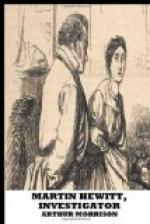“My subsequent coolness and quietness surprise me now. I took my hat and stepped toward the door. But there were voices on the stairs. The door was locked on the inside, and I left it so. I went back and quietly opened a window. Below was a clear drop into darkness, and above was plain wall; but away to one side, where the slope of the gable sprang from the roof, an iron gutter ended, supported by a strong bracket. It was the only way. I got upon the sill and carefully shut the window behind me, for people were already knocking at the lobby door. From the end of the sill, holding on by the reveal of the window with one hand, leaning and stretching my utmost, I caught the gutter, swung myself clear, and scrambled on the roof. I climbed over many roofs before I found, in an adjoining street, a ladder lashed perpendicularly against the front of a house in course of repair. This, to me, was an easy opportunity of descent, notwithstanding the boards fastened over the face of the ladder, and I availed myself of it.
“I have taken some time and trouble in order that you (so far as I am aware the only human being beside myself who knows me to be the author of Foggatt’s death) shall have at least the means of appraising my crime at its just value of culpability. How much you already know of what I have told you I can not guess. I am wrong, hardened, and flagitious, I make no doubt, but I speak of the facts as they are. You see the thing, of course, from your own point of view—I from mine. And I remember my mother!
“Trusting that you will forgive the odd freak of a man—a criminal, let us say—who makes a confidant of the man set to hunt him down, I beg leave to be, sir, your obedient servant,
“SIDNEY MASON.”
I read the singular document through and handed it back to Hewitt.
“How does it strike you?” Hewitt asked.
“Mason would seem to be a man of very marked character,” I said. “Certainly no fool. And, if his tale is true, Foggatt is no great loss to the world.”
“Just so—if the tale is true. Personally I am disposed to believe it is.”
“Where was the letter posted?”
“It wasn’t posted. It was handed in with the others from the front-door letter-box this morning in an unstamped envelope. He must have dropped it in himself during the night. Paper,” Hewitt proceeded, holding it up to the light, “Turkey mill, ruled foolscap. Envelope, blue, official shape, Pirie’s watermark. Both quite ordinary and no special marks.”
“Where do you suppose he’s gone?”
“Impossible to guess. Some might think he meant suicide by the expression ‘beyond the reach even of your abilities of search,’ but I scarcely think he is the sort of man to do that. No, there is no telling. Something may be got by inquiring at his late address, of course; but, when such a man tells you he doesn’t think you will find him, you may count upon its being a difficult job. His opinion is not to be despised.”




